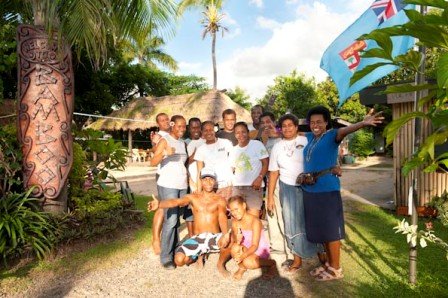Suva is Fiji's political and administrative capital and home to almost half of the country's population. It is the largest urban area in the South Pacific outside of Australia and New Zealand and we discover is twinned with Brighton!
Unlike our last visit the sun is shining as we reach the bus station and we walk uphill fully loaded to our new residence "Tropic Towers".
It was not, in reality, anything as nice as it sounds - but we had huge trouble trying to find somewhere to stay in Suva. A combination of city prices and lack of availabilty means that we stayed in probably the best of a bad bunch. The area was great, location wise, in that it was close to the bus station and close enough to the centre of the city. Not so great after dark - in fact the security man on the gate would not let David walk the short distance down the hill to the internet cafe but insisted he went there and back by taxi! Fortunately we were only there for one night.
We were able to pick up the Lonely Planet New Zealand guide from the University of the South Pacific campus bookshop and took in some culture at the Suva National Museum located in the capital city's botanical gardens, Thurston Gardens.
The museum houses an extensive archaeological collection dating back 3,700 years and relics of Fiji's indigenous cultural history. Also on display is the rudder of the HMS Bounty of mutiny fame.
The biggest exhibit is the enormous bilibili or bamboo rafts used until circa 1900 to transport produce between islands or for fishing trips.
 We see lots of "cannibal" exhibits - they were still eating people in Fiji 150 years ago! These are huge house posts - one for each side of the house. Often live human sacrifices were thrown into the hole before the posts - this was thought to strengthen the foundations and offer protection to the residents!
We see lots of "cannibal" exhibits - they were still eating people in Fiji 150 years ago! These are huge house posts - one for each side of the house. Often live human sacrifices were thrown into the hole before the posts - this was thought to strengthen the foundations and offer protection to the residents!
David tries out the head chopping stone!
By 1867 cannibalism was dying out but ironically the last act of cannibalism in Fiji claimed the lives of an English missionary, the Reverend Thomas Baker of East Sussex, and his accompanying party of Methodist Fijians. On the Fijian islands eating one's enemies was a time-honoured tradition. Sufficient for the act was a declaration of war, often made in symbolic form, such as by insulting the chief of another tribe.
Fiji in 1867 was still an untamed paradise and when Reverend Baker and his group of eight Fijian helpers made the arduous trek to the isolated village of Nabutautau, it was with the intention of bringing the blessings of Christianity and Western Civilisation to the natives.
Initially the party was made welcome but an inadvertant act changed this rather quickly! Accounts differ as to whether it was a hat or a comb that the Reverend Baker tried to retrieve, but the fact remains that he touched the chief's head, a totally forbidden act. Punishment was swift . The missionary and his war party were dispatched with clubs, and their remains consumed. By the time the cooking fires had been dampened, there was nothing left of the Reverend Baker but his boots. The remnants of which are retained for display, along with the fork and bowl used to consume him.
We also see a fascinating photo and artefact gallery chronicling the introduction of indentured Indian workers to Fiji by the Europeans from the mid 1870s. Indo Fijians are mostly descended from indentured labourers , girmitiyas or girmit, brought to the islands by Fiji's British colonial rulers between 1879 and 1916 to work on Fiji's sugar cane plantations. These were complemented by the later arrival of Gujarati and Punjabi immigrants who arrived as free settlers in comparison to their counterparts who were brought under the indentured labour system. They have adapted to the new environment with changes to their dress, language and culinary habits, although they have maintained their distinct culture. The Fiji Indians have fought for equal rights, although with only limited success.
We visit the Government Buildings on our way back to find an internet cafe to catch up on emails and then head back to the hotel for a swim and supper.We are really trying hard to expose the girls to a bit of the social and political history of Fiji as we go, as well as the animal and plant life. However tempers frayed a bit today and words were had! We are all in need of some down time now and the chance to step back, take a breath and reflect on our time here.


















































